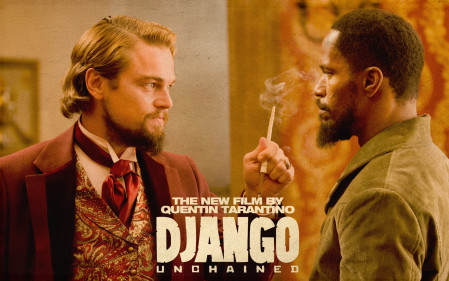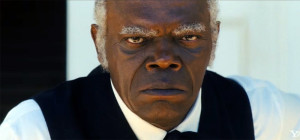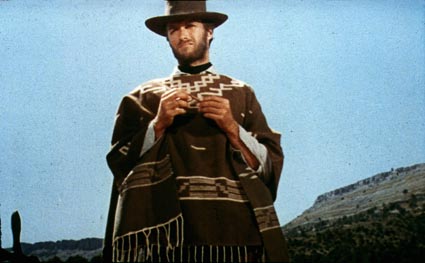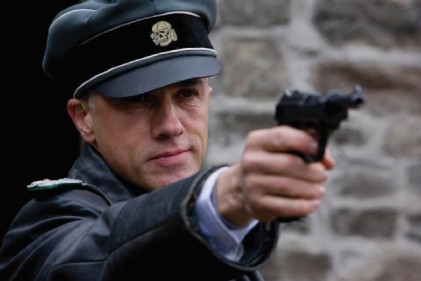At the Movies

(Lennie and Jamie exchange meaningful looks.)
It was a marvelous Christmas outing. I went to the movies with ENS Socotra.
This may not strike you as something unusual enough to talk about on the one-day hang-over holiday. There were some things that could not fit into the schedule that I really wanted to do, but ran out of airspeed and ideas all at the same time.
I don’t enjoy going to the movies by myself and it has been a while. I make mental notes to rent the ones that appear interesting when they are released digitally, but never seem to get around to it. I had forgotten how expensive it is to go to the walk-in, but this was a real treat.
My son’s preference was to see “Django Unchained,” an action film by celebrated director Quentin Tarantino, whose last effort I saw at the walk-in theater was “Reservoir Dogs.” I thought maybe some excitement and gratuitous violence was just right for the day, and readily agreed.
We trooped into darkened cinema 7 on the second level of the theatre complex, me being careful to keep my feet beneath me in the darkness. We were early and the crowd was fairly thin for the 1300 showing. I could not tell what were ads- there appeared to be a movie in progress, as we got comfortable with the bags of popcorn and tubs of beverage.
It occurred to me along the way that I should have brought a flask as I realized the “movie” was actually an ad for a video game. The minutes to show time ticked off with more ads, and then transitioned to no less than five trailers approved for audiences of all ages.
At length- and ominously I realized I really should have stopped at the Little Captain’s room on the way in, since we were seated in the middle of the row, dead center, and tumbling face forward down the stairs was not high on my list of mid-film adventures. I resolved to think of things other than roaring streams or waterfalls for the duration of the cinematic experience.

(The remarkable Samuel L. Jackson as the villainous Stephen.)
I had read mixed reviews about “Django Unchained,” but that is true with all Tarantino films. It was a Dynamite cast- Samuel L. Jackson, Leonardo DiCaprio, Jamie Foxx and Christoph Waltz with some supporting female actors who were quite good, including the lovely Kerry Washington as Django’s love interest Broomhilda. I can’t remember if she shot anyone, though I think all the men did.
This film was, by turns, intended to be an homage to the old Spaghetti Western genre, a historical hoax, a narrative of racial retribution, an exploration of ultra violence, and a bizarre attempt to rehabilitate an ethnic slur of such power that its very use could result in termination of employment almost anywhere outside the Regal 12 Cineplex complex.
Tarantino has been mining the pulp genre for years, and in Django he even gave screen credit to legendary Italian director Sergio Leone for this contributions to western civilization. His “Dollars” films really define a hallucinogenic view of an imaginary and hyper-violent America not a great deal different from the well-established Italian surrealism of his contemporary Federico Fellini, whose work I greatly admire.
You could paste the Fistful of Dollars Trilogy into Django without much trouble. In the originals, the hero enters the town ruled by outlaw gangs and ordinary social relations are non-existent. Much gunfire ensures. The Director is Italian, while the technical crew is euro-centric, with actors from the Continent and a few Hollywood stars on the way up or the way down.

(Young Clint on the Plains of Spain.)
You recall just how powerful the young Clint Eastwood was in those films. Way more ruthless than the Rowdy Yates character he played in the TV oater “Rawhide.”
The soundtrack is critical to the whole enterprise, of course, and this was more homage, a bizarre selection of catchy tunes from several decades unrelated to the purported year in which it was taking place- 1858. You can see the artists who contributed the 24 tracks here.
It is a pretty amazing compendium. Tarantino is nothing if not eclectic in his tastes.
I can’t and won’t use any of the astonishing lines. Tarantino sprinkled them liberally through the screenplay, and the defense to the whole usage issue is the progressive artistic view is that repetitive use tends to rob the power from the word.
I seriously doubt that, but that is Quentin for you, and I am naturally a supporter of the First Amendment, Mr. Tarantino and Mark Twain, who gets dragged into the debate.
The movie itself was good for nearly three hours running time- enough for two features in a less indulgent world, and this experience was indulgence personified. I think Christoph Waltz perfect. He looked familiar, though I could swear I had never seen him before. The ENS told me he was a German who had played a Nazi offcer in Tarantino’s previous effort,“Inglourious Basterds.” He won an academy award for it, too.

(Christoph Waltz as a Nazi SS officer.)
That is another of the films I let go by. I want it on the record that I am in favor of hitting Nazis with ball-bats, which I gathered was the plot, but I felt my tacit support was about all I really needed to do.
Did I mention that in addition to 111 uses of the racial epithet, there were something approaching 50 acts of murder in the film?
I did not know quite what to make of things. My favorite murder was….oh Hell, I am not going to be a spoiler. When we emerged, I was desperate to find a men’s room, and quite uncertain what to make of the whole thing, the line of people waiting to get in stretched all the way back out to the lobby and beyond.
“Christmas cabin fever,” I said as we emerged. “And this film is the perfect antidote to an overdose of Peace on Earth.”
“Get with it, Pops,” said my son. “It is just a movie.”
“And a good one,” I said. “I think.”
Copyright 2012 Vic Socotra
www.vicsocotra.com
